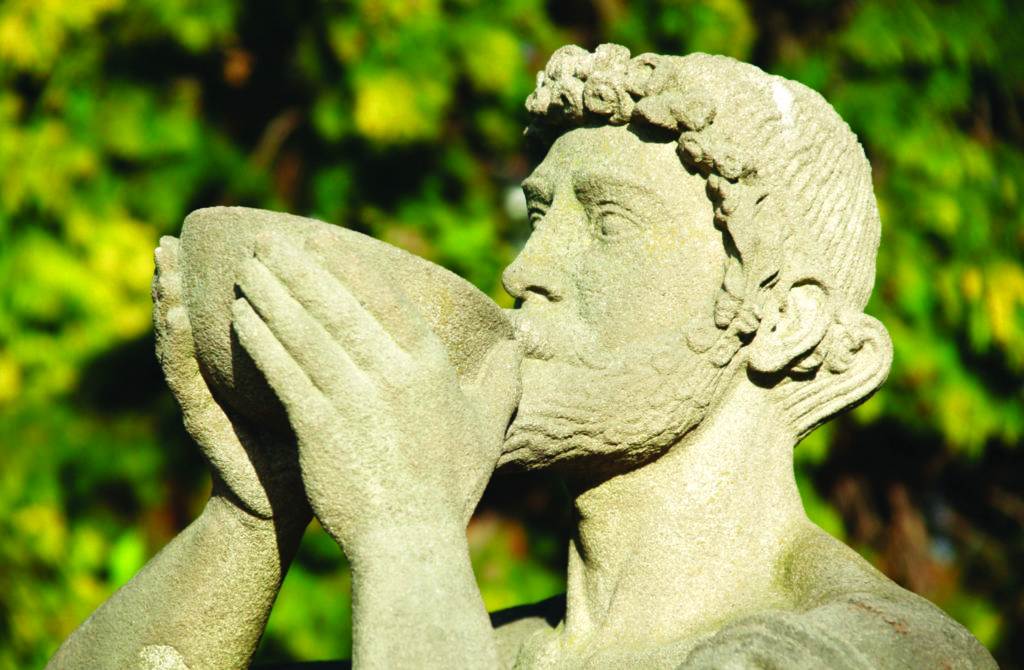How Our Natural Desire
for Altered States Fuels
the Creative Process
BY AUSTIN HILL SHAW
“Wisdom hath builded her house. Come and enjoy my bread and wine which I have mixed for you.”
—Proverbs 9:1 and 5
My fourteen-month-old daughter loves to swing. I take her to the playground, slot her little legs into the safety seat, position her hands on the chain, give her a dramatic countdown as I lift the swing upward, then, her eyes wide in anticipation, Blastoff! I let the swing go and she squeals with delight.
When we first started I proceeded with caution, making sure she felt safe and that her large head atop her little neck wasn’t being jerked around. As the months wore on I began pushing her higher and higher, egged on by her obvious enjoyment. Sometimes it seemed like I might be pushing too hard. The swing would wobble, her eyes would roll back in her head, and she would go silent. As her father who wants nothing more than for her to thrive and feel loved and protected, I immediately slowed the pace and asked if she was okay. Startlingly enough, she would look me in the eye, remove her hands from the chain, and vigorously touch her fingertips together in front of her chest, sign language for “More!”

What is it that my daughter likes so much about the moments when the swing twists and jerks and things get a little out of control? Is it a break from her routine of being coddled? Is it a chance to feel the joy of motion months before she can walk on her own? Or is there something happening which is far more profound, something that points to more fundamental drives in all of us?
To understand my daughter’s experience, we must delve into a basic yet somewhat ill-reputed desire that affects us all—intoxication. The word intoxication has two distinct yet interrelated meanings. On one hand it implies inebriation: the impairment of motor skills and a compromised ability to think rationally, qualities that we disdainfully associate with drunkards and misfits. Intoxication is also associated with exhilaration, awe, the coveted experience of falling in love, even spiritual and religious transcendence. Intoxication in this latter sense isn’t reserved for the seemingly broken and maladjusted, but for the visionaries, innovators, poets, and mystics, those celebrated human catalysts stirring the pot of progress and innovation.
For humans, especially little ones like my daughter, with each new ability gained there is also the accompanying desire to test it, to engage it in different ways. For example, she recently started walking, which involved balance and coordination. But soon thereafter, she learned how to spin, a feat that compromised her ability to stand upright. The combination of her first balancing, then spinning and then falling down, gave her perspective. It allowed her in her playful way to appreciate the value of both. Experientially she learned what to avoid if she intended to stay upright and also what to do if standing upright for some reason became boring.
These cycles of first establishing one’s footing, then falling down for one reason or another have driven the progression of humankind since the beginning. But how does it work? How does intoxication serve creative innovation? As its two main definitions imply, intoxication compromises, or suspends, certain abilities that we rely on habitually so that shier insights and abilities can come to the foreground. Like well-placed stoplights along a busy street, intoxication can skillfully stop the prevalent flow of mental traffic so that other, quieter streets (of consciousness) can allow their passengers travel time.
With all this in mind, it is my belief that intoxication is the biological desire driving the plasticity of the brain itself. By its very nature, intoxication derails our ability to conduct business as usual, leaving us unable to do certain activities, but open to fresh ways of seeing the world. If we embrace intoxication as a natural part of our body-mind makeup, we can utilize those miraculous states as catalysts for our own growth, creativity, and full-person integration. In this way, we don’t look at intoxication as simply “checking out,” “taking a load off,” or “blowing off steam.” We celebrate it for what it is—our intelligent bodies, our expansive hearts, and our powerful yet habit-prone minds asking us to take a breather from our own tired world view.
So the next time you feel the urge to make your swing twist and shake, the next time you grow weary of walking a straight line from one pre-planned appointment to the next, honor that voice that desires to scramble you, that voice that desires to set things off-kilter. Cozy on up to your own well-to-do persona running aground on the rocky shores of the unknown. Feel your ship splinter. Allow your masthead to fall into the sea. Drown for a spell—and then resurface.
By submitting to intoxicating experiences we allow them to push us forth in new, enlivening directions, and guide us deeper and deeper into the awesome mystery that surrounds us. In this light, intoxication, when seen for what it really is, can be a wise teacher and a valued friend during our life’s journey.
Austin Hill Shaw is a keynote speaker and founder of the Core Needs Design Method, a pioneering approach to architecture that seeks to connect design clients to both themselves and the land their project occupies. Check out his innovative offerings at 3LightsDesign.com